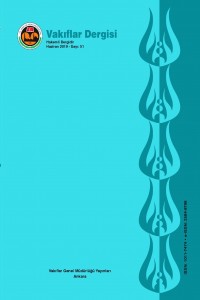Abstract
Many
waqfs were established in Urfa during the Ottoman period by both local
philanthropists and pashas who served in this region. It is certain that these
waqfs, which were established as a manifestation of the principle of “racing
towards good deeds” in Islamic tradition, have the biggest share in
reconstruction of the city and meeting the social needs of its citizens. One of
the most important service areas of waqfs, contributing in many fields from
transportation to trade, from education to health, has been mosques and
masjids. This article focuses on the services carried out by waqfs such as the
construction, maintenance, repair, cleaning, lighting of mosques and the
employment of the personnel needed to perform their functions, based on the
information in waqfiyyas.
References
- Çağatay, Neşet (1978). “Sultan Murad Hüdâvendigar Adına Düzenlenmiş Bir Vakfiye” Vakıflar Dergisi, C. 12: s. 7-14, Ankara.
- Devellioğlu, Ferit (1992). Osmanlıca-Türkçe Ansiklopedik Lügat, Aydın Kitabevi, Ankara.
- Ertem, Adnan (2011). “Osmanlıdan Günümüze Vakıflar”, Vakıflar Dergisi, C. 36: s. 25-65, Ankara.
- Evliya Çelebi (1314). Seyahatnâme, C. 3, İkdam Matbaası, İstanbul.
- Göyünç, Nejat (1969). XVI. Yüzyılda Mardin Sancağı, İÜ Edebiyat Fak. Yayınları, İstanbul.
- Işık, Hayriye (2009). “Bir Kamu Hizmeti Birimi Olarak Vakıfların Osmanlı Toplum Yaşamındaki Rolü”, Akademik Bakış, Uluslararası Hakemli Sosyal Bilimler E-Dergisi, Sy:16. (http://www.akademikbakis.org).
- Karakeçili, Enver (2016). “Ruha Kazasına Ait Hurûfat Defterlerinin (1690-1837) Muhteviyatı ve Şehrin Yapılarına İlişkin Sayısal Tespitler”, İslam Tarihi ve Medeniyetinde Şanlıurfa, Şanlıurfa BB Yayınları, C. 1: 378-399, İzmir.
- Karakeçili, Enver (2017). Hurûfât Defterlerine Göre 1690-1837 Tarihlerinde Ruha Kazası, ŞURKAV Yayınları, Şanlıurfa.
- Kazıcı, Ziya (1993). “Osmanlı Arşiv Belgelerine Göre Urfa’daki Vakıf Hizmetleri”, MÜ İlahiyat Fakültesi Dergisi, C. 5-6: 85-102, İstanbul.
- Kürkçüoğlu, Cihat (1993). Şanlıurfa Camileri, ŞURKAV Yayınları, Ankara.
- Pakalın, M. Zeki (1993). Osmanlı Tarih Deyimleri ve Terimleri Sözlüğü, MEB Yayınları, İstanbul.
- Turgut, Bahattin (2013). Urfa Vakıfları (1850-1900). Doktora Tezi, MÜ Sosyal bilimler Enstitüsü, İstanbul.
- Ülken, Hilmi Ziya (2006). “Vakıf Sistemi ve Türk Şehirciliği”, Vakıflar Dergisi, C. 9: 13-38. (Tıpkıbasım). Ankara.
- Şemseddin Sâmi (1989). Kâmûs-ı Türkî, Enderun Yayınları, İstanbul.
- Yediyıldız, Bahaeddin (1983). “Vakıf Istılahları Lügatçesi”, Vakıflar Dergisi, C. 17: 55-60, Ankara.
- Yediyıldız, Bahaeddin (1993). “Vakıf”. İslam Ansiklopedisi, C. 13: s.153-172. MEB Yayınları.
- Yediyıldız, Bahaeddin (2012). “Vakıf”. TDV İslam Ansiklopedisi, C. 42: s. 479-486. İstanbul.
Abstract
Osmanlı
döneminde gerek yerli hayırseverler ve gerekse bu bölgede idari görevlerde
bulunmuş paşalar tarafından Urfa’da birçok vakıf kurulmuştur. İslam
anlayışındaki iyilikte ve hayırda yarışma ilkesinin bir tezahürü olarak kurulan
bu vakıfların şehrin imarında ve Urfa halkının çeşitli alanlardaki sosyal
ihtiyaçlarının karşılanmasında en büyük paya sahip olduğu muhakkaktır.
Ulaşımdan ticarete, eğitimden sağlığa kadar birçok alanda katkı sağlayan
vakıfların en önemli hizmet alanlarından biri de cami ve mescitler olmuştur. Bu
makalede vakfiyelerdeki bilgilere dayanılarak, camilerin inşası, bakım ve
onarımları, temizlik, aydınlatma ve işlevlerini yerine getirebilmeleri için
ihtiyaç duydukları personelin istihdamı gibi vakıflar tarafından yürütülen
hizmetler konu edilmiştir.
Keywords
References
- Çağatay, Neşet (1978). “Sultan Murad Hüdâvendigar Adına Düzenlenmiş Bir Vakfiye” Vakıflar Dergisi, C. 12: s. 7-14, Ankara.
- Devellioğlu, Ferit (1992). Osmanlıca-Türkçe Ansiklopedik Lügat, Aydın Kitabevi, Ankara.
- Ertem, Adnan (2011). “Osmanlıdan Günümüze Vakıflar”, Vakıflar Dergisi, C. 36: s. 25-65, Ankara.
- Evliya Çelebi (1314). Seyahatnâme, C. 3, İkdam Matbaası, İstanbul.
- Göyünç, Nejat (1969). XVI. Yüzyılda Mardin Sancağı, İÜ Edebiyat Fak. Yayınları, İstanbul.
- Işık, Hayriye (2009). “Bir Kamu Hizmeti Birimi Olarak Vakıfların Osmanlı Toplum Yaşamındaki Rolü”, Akademik Bakış, Uluslararası Hakemli Sosyal Bilimler E-Dergisi, Sy:16. (http://www.akademikbakis.org).
- Karakeçili, Enver (2016). “Ruha Kazasına Ait Hurûfat Defterlerinin (1690-1837) Muhteviyatı ve Şehrin Yapılarına İlişkin Sayısal Tespitler”, İslam Tarihi ve Medeniyetinde Şanlıurfa, Şanlıurfa BB Yayınları, C. 1: 378-399, İzmir.
- Karakeçili, Enver (2017). Hurûfât Defterlerine Göre 1690-1837 Tarihlerinde Ruha Kazası, ŞURKAV Yayınları, Şanlıurfa.
- Kazıcı, Ziya (1993). “Osmanlı Arşiv Belgelerine Göre Urfa’daki Vakıf Hizmetleri”, MÜ İlahiyat Fakültesi Dergisi, C. 5-6: 85-102, İstanbul.
- Kürkçüoğlu, Cihat (1993). Şanlıurfa Camileri, ŞURKAV Yayınları, Ankara.
- Pakalın, M. Zeki (1993). Osmanlı Tarih Deyimleri ve Terimleri Sözlüğü, MEB Yayınları, İstanbul.
- Turgut, Bahattin (2013). Urfa Vakıfları (1850-1900). Doktora Tezi, MÜ Sosyal bilimler Enstitüsü, İstanbul.
- Ülken, Hilmi Ziya (2006). “Vakıf Sistemi ve Türk Şehirciliği”, Vakıflar Dergisi, C. 9: 13-38. (Tıpkıbasım). Ankara.
- Şemseddin Sâmi (1989). Kâmûs-ı Türkî, Enderun Yayınları, İstanbul.
- Yediyıldız, Bahaeddin (1983). “Vakıf Istılahları Lügatçesi”, Vakıflar Dergisi, C. 17: 55-60, Ankara.
- Yediyıldız, Bahaeddin (1993). “Vakıf”. İslam Ansiklopedisi, C. 13: s.153-172. MEB Yayınları.
- Yediyıldız, Bahaeddin (2012). “Vakıf”. TDV İslam Ansiklopedisi, C. 42: s. 479-486. İstanbul.
Details
| Primary Language | Turkish |
|---|---|
| Journal Section | Articles |
| Authors | |
| Publication Date | June 30, 2019 |
| Submission Date | October 18, 2018 |
| Acceptance Date | May 31, 2019 |
| Published in Issue | Year 2019 Issue: 51 |
The articles sent to the Journal of Waqfs with a request for publication are subject to preliminary examination by the Editorial Board and at least two academicians who are experts in their fields are sent for review. The copyright of the articles accepted to be published in the Journal of Waqfs with the referee reports and the decision of the Editorial Board is deemed to have been transferred to the General Directorate of Foundations, and a royalty fee is paid to the published articles in accordance with the relevant legislation.


